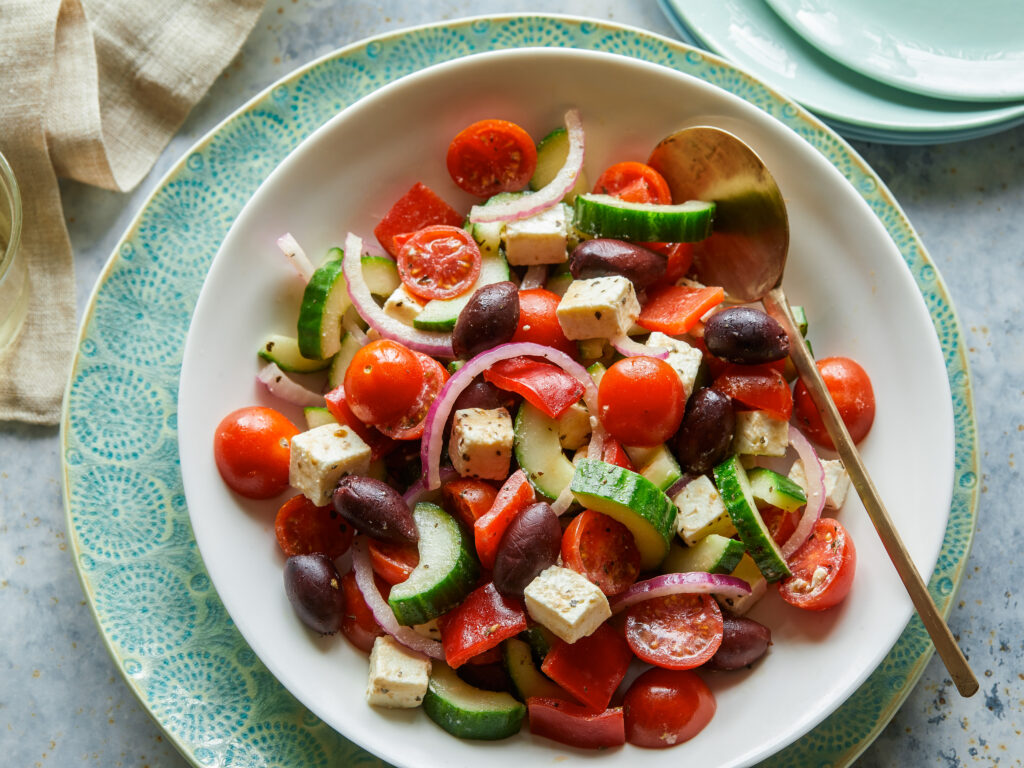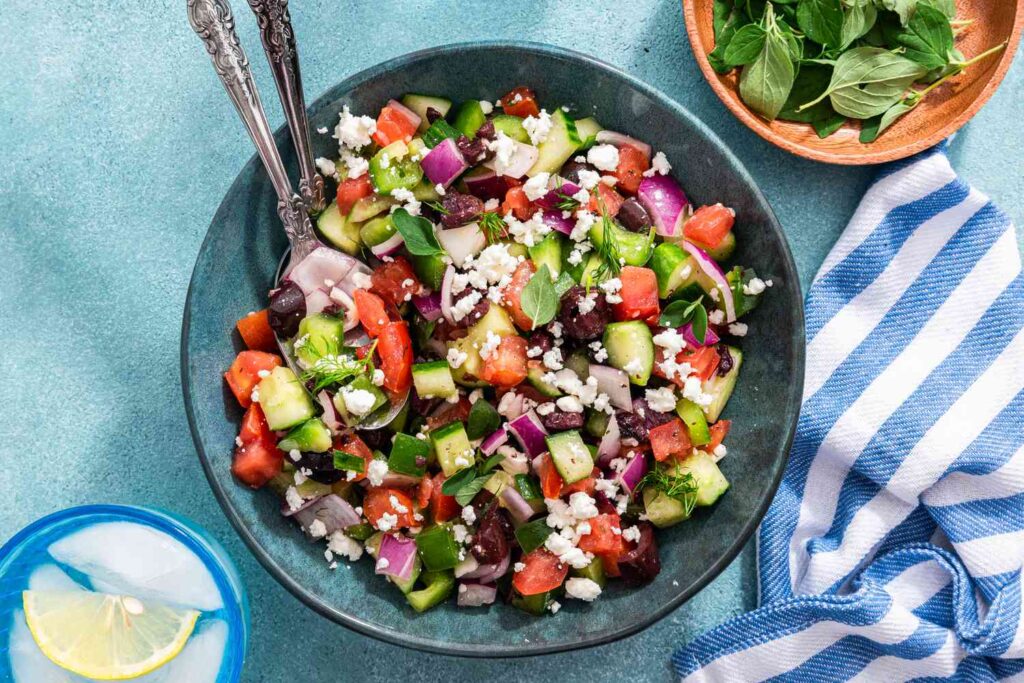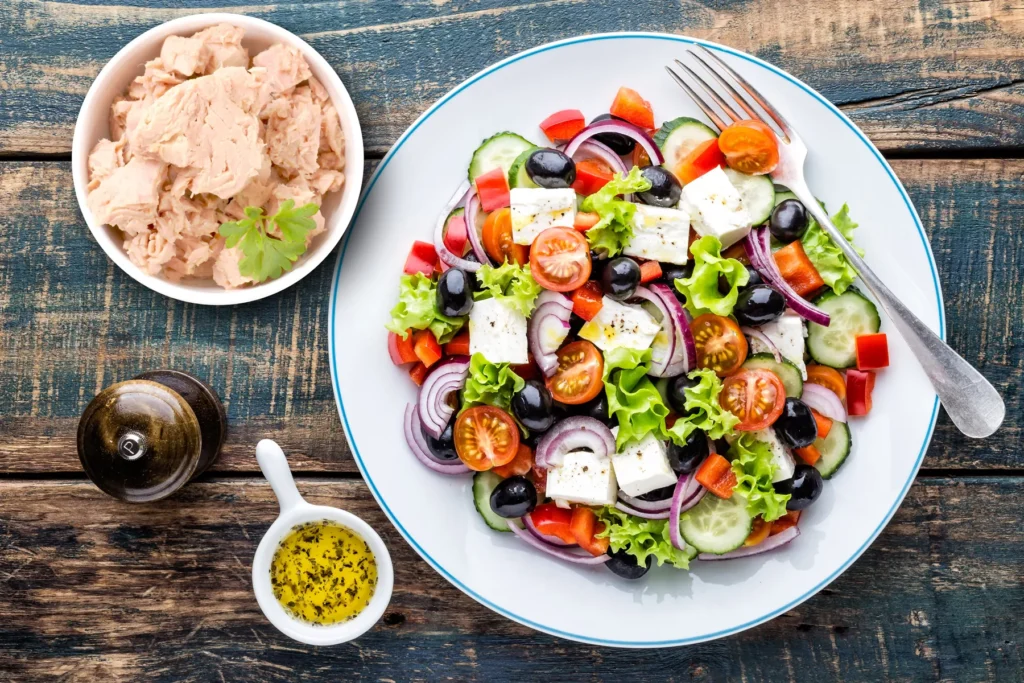When the scorching summer sun is blazing overhead, and the sweat is pouring down your brow, nothing refreshes quite like a crisp, cool salad.
And when it comes to salads that are as delicious as they are nutritious, Greek summer salads take the crown.
Bursting with fresh ingredients, vibrant colors, and tantalizing flavors, these salads are not only a feast for the taste buds but also a boon for fitness enthusiasts looking to fuel their bodies with wholesome goodness.
So, let’s dive into the world of Greek summer salads and discover the perfect combinations to keep you feeling energized and satisfied all season long.

The Essence of Greek Cuisine in Summer Salads
Greek cuisine is renowned for its emphasis on fresh, seasonal ingredients and simple yet flavorful dishes.
And when it comes to summer salads, this culinary tradition truly shines.
At the heart of every Greek summer salad lies the perfect balance of crisp vegetables, tangy cheeses, briny olives, and aromatic herbs, all drizzled with a generous glug of extra virgin olive oil and a squeeze of zesty lemon juice.
It’s a symphony of flavors that celebrates the bountiful produce of the Mediterranean region and showcases the art of simplicity in cooking.
The Power of Fresh Ingredients
One of the key secrets behind the irresistible appeal of Greek summer salads is the use of fresh, high-quality ingredients.
From plump, juicy tomatoes to crunchy cucumbers, peppery arugula, and creamy feta cheese, each component plays a crucial role in creating a harmonious blend of textures and tastes.
By choosing locally sourced, seasonal produce, you not only elevate the flavor profile of your salad but also support sustainable farming practices and reduce your carbon footprint.
Embracing the Mediterranean Diet
Greek summer salads are not just about tantalizing your taste buds—they also offer a myriad of health benefits, thanks to their adherence to the principles of the Mediterranean diet.
Rich in heart-healthy fats, fiber, vitamins, and antioxidants, these salads provide a nutrient-dense feast that nourishes your body from the inside out.
Whether you’re looking to maintain a healthy weight, reduce the risk of chronic diseases, or simply boost your energy levels, incorporating Greek summer salads into your diet is a deliciously effective way to promote overall well-being.
Exploring Flavorful Variations
One of the joys of Greek summer salads is their versatility.
From the classic Greek salad, or “Horiatiki,” with its medley of tomatoes, cucumbers, onions, olives, and feta cheese, to creative twists like watermelon and feta salad or grilled vegetable panzanella, the possibilities are endless.
Whether you prefer your salads light and refreshing or hearty and satisfying, there’s a Greek-inspired creation to suit every palate and occasion.

Fueling Your Fitness Journey
For fitness enthusiasts, Greek summer salads offer the perfect balance of macronutrients to support your active lifestyle.
The combination of complex carbohydrates from fresh vegetables, protein from cheese or grilled meats, and healthy fats from olive oil provides sustained energy to power you through your workouts and aid in post-exercise recovery.
Plus, the hydrating properties of vegetables and fruits help replenish electrolytes lost through sweat, keeping you feeling refreshed and revitalized.
Tips for Building the Perfect Greek Summer Salad
Creating your own Greek summer salad is as easy as tossing together a few simple ingredients.
Start with a base of crisp lettuce or leafy greens, then add a variety of chopped vegetables such as tomatoes, cucumbers, bell peppers, and red onions.
Next, sprinkle on some crumbled feta cheese for a creamy, tangy kick, and top it off with a handful of briny olives and a drizzle of extra virgin olive oil.
Finish with a squeeze of lemon juice, a sprinkle of dried oregano, and a pinch of sea salt for an extra burst of flavor.
Pairing Salads with Protein
To make your Greek summer salad more substantial, consider adding a source of lean protein such as grilled chicken, shrimp, tofu, or chickpeas.
Not only does protein help keep you feeling full and satisfied, but it also supports muscle repair and growth, making it an essential component of any post-workout meal.
Experiment with different protein options to find the combination that best suits your taste preferences and dietary needs.
Conclusion
In conclusion, Greek summer salads are a delicious and nutritious addition to any fitness enthusiast’s meal plan.
With their emphasis on fresh ingredients, bold flavors, and satisfying textures, these salads offer a taste of the Mediterranean that is sure to delight your palate and nourish your body.
So, why not take advantage of the abundance of summer produce and whip up a Greek-inspired masterpiece today?

FAQs
Q: Can I make Greek summer salads ahead of time?
A: Absolutely! Greek summer salads are perfect for meal prep.
Simply chop your ingredients, store them in separate containers, and assemble your salad just before serving to keep it fresh and vibrant.
Q: Are Greek summer salads suitable for vegetarians and vegans?
A: Yes, Greek summer salads can easily be customized to suit vegetarian and vegan diets.
Simply omit the cheese or use a plant-based alternative, and opt for protein-rich ingredients like tofu or chickpeas to ensure a well-balanced meal.
Q: Can I add grains like quinoa or couscous to my Greek summer salad?
A: Absolutely! Grains can add a hearty texture and extra dose of nutrients to your salad.
Simply cook your grains according to package instructions and toss them with your favorite Greek salad ingredients for a satisfying meal.
Q: How long will Greek summer salads stay fresh in the refrigerator?
A: Greek summer salads are best enjoyed fresh but can typically be stored in the refrigerator for up to 2-3 days.
To keep your salad crisp and flavorful, store it in an airtight container and dress it just before serving.
Q: Can I use different types of cheese in my Greek summer salad?
A: Absolutely! While feta cheese is the classic choice for Greek salads, you can experiment with different types of cheese to suit your taste preferences.
Try goat cheese, ricotta salata, or even a crumbled blue cheese for a unique twist on this Mediterranean favorite.
